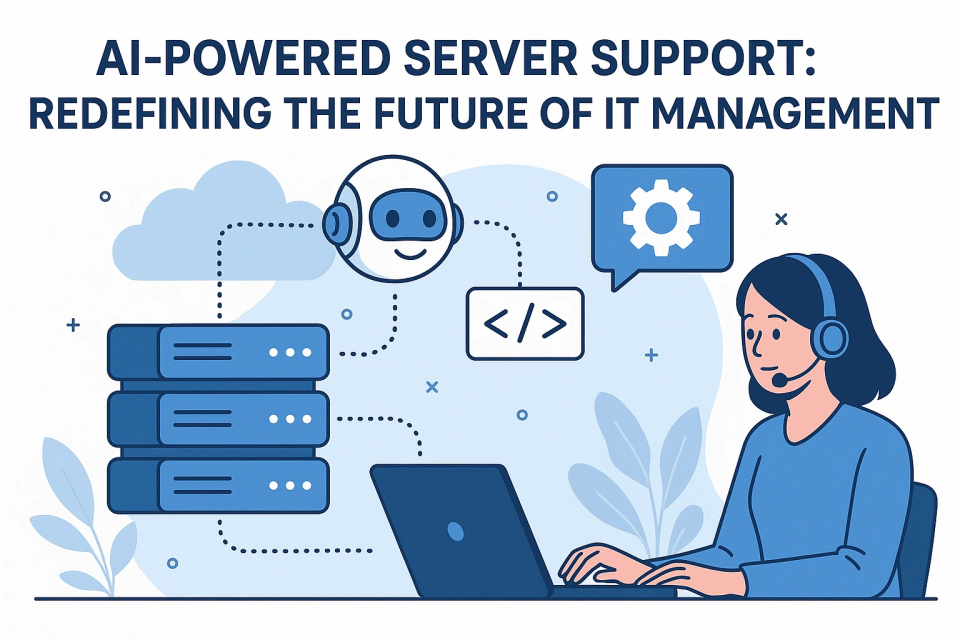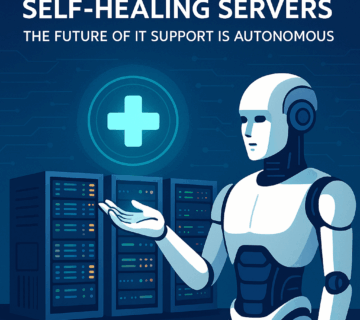AI-Powered Server Support: Redefining the Future of IT Management

The world of IT management is experiencing a seismic transformation. Traditional server support models once reliant on manual monitoring, reactive troubleshooting, and time-consuming maintenance—are being replaced with smarter, more adaptive systems. At the core of this change is Artificial Intelligence (AI), which has evolved from a buzzword into a mission-critical technology. AI-powered server support goes far beyond automation. It introduces predictive analytics, self-healing infrastructures, intelligent monitoring, and decision-making capabilities that reduce downtime, improve performance, and redefine the future of IT management.
Why Traditional IT Management Is Struggling
Modern organizations depend heavily on digital infrastructure. Yet, many IT departments still face recurring challenges:
- Reactive Troubleshooting: Issues are often addressed only after they impact operations.
- High Downtime Costs: A single outage can cost businesses thousands—or even millions—per hour.
- Complex Environments: With cloud, hybrid, and on-premises systems running simultaneously, server management is more complex than ever.
- Resource Constraints: Skilled IT staff are often stretched thin, balancing day-to-day operations with long-term innovation.
These challenges make clear why businesses need an intelligent, proactive, and scalable solution. This is where AI-powered server support shines.
What Is AI-Powered Server Support?
AI-powered server support refers to the use of artificial intelligence and machine learning to automate, optimize, and predict IT infrastructure performance. It combines intelligent monitoring, anomaly detection, predictive maintenance, and automated response systems to create self-managing servers.
Key features include:
- Predictive Analytics – AI forecasts potential server failures before they happen.
- Intelligent Monitoring – Real-time analysis of performance metrics and user activity.
- Automated Remediation – AI systems can resolve issues without human intervention.
- Adaptive Optimization – Continuous performance tuning based on workloads.
- Self-Learning Models – AI improves accuracy over time by learning from data patterns.
Benefits of AI-Powered Server Support
1. Proactive Issue Resolution
Unlike traditional methods, AI doesn’t wait for errors to occur. It identifies early warning signs, sends alerts, and often fixes issues before they escalate.
2. Reduced Downtime
By predicting and preventing failures, businesses can minimize costly downtime and keep services running smoothly.
3. Enhanced Security
AI-powered systems monitor for unusual behavior, helping detect cyber threats and insider risks much faster than manual methods.
4. Cost Efficiency
Automation reduces the need for constant human intervention, freeing IT teams to focus on innovation instead of firefighting.
5. Scalability
AI solutions adapt to growing infrastructure needs, making them ideal for enterprises with hybrid or multi-cloud environments.
Real-World Applications of AI in IT Management
- Self-Healing Servers – AI systems can automatically restart services, apply patches, or reallocate resources when problems arise.
- Capacity Planning – AI analyzes workload trends and recommends infrastructure upgrades before demand spikes.
- Threat Detection – Machine learning models identify abnormal activities that indicate malware, ransomware, or insider attacks.
- Virtual Assistants for IT – Chatbots can answer employee IT queries, reset passwords, and escalate issues.
- Energy Efficiency – AI optimizes server energy use, reducing costs and supporting sustainability goals.
The Future of IT with AI-Driven Support
1. Predictive IT Operations (AIOps)
AIOps platforms combine big data, analytics, and machine learning to automate IT operations at scale. Gartner predicts that by 2030, most organizations will rely on AIOps-driven strategies for infrastructure management.
2. Autonomous Infrastructure
The ultimate vision of AI-powered server support is a self-driving data center, where servers self-configure, self-heal, and self-optimize with minimal human input.
3. Human-AI Collaboration
Rather than replacing IT teams, AI will act as a force multiplier, enhancing productivity by handling repetitive tasks while humans focus on strategic decision-making.
4. Smarter Hybrid Cloud Management
AI will simplify managing hybrid and multi-cloud environments, ensuring seamless workload distribution, security compliance, and cost optimization.
Challenges and Considerations
While AI-powered server support offers immense potential, businesses must address several considerations:
- Data Privacy & Security – AI systems must comply with strict data protection regulations.
- Integration with Legacy Systems – Transitioning from traditional to AI-powered systems requires careful planning.
- Skills Gap – IT teams need training to effectively work alongside AI-driven tools.
- Initial Investment – While cost-saving long-term, implementation can require significant upfront investment.
Best Practices for Implementing AI-Powered Server Support
- Start with Pilot Projects – Begin by automating specific server management tasks before scaling across the organization.
- Invest in Training – Upskill IT staff to work effectively with AI systems.
- Prioritize Security – Ensure AI-powered solutions include strong cybersecurity measures.
- Choose the Right Vendor – Partner with trusted IT service providers experienced in AI integrations.
- Monitor and Refine – Continuously evaluate AI performance to ensure ongoing optimization.
Case Study: How AI Saved a Global Enterprise Millions
A Fortune 500 company faced frequent outages in its hybrid cloud environment, costing an average of $350,000 per incident. By implementing AI-powered monitoring and predictive analytics, the company reduced unplanned downtime by 60%.
- Problem: Frequent outages, costly downtimes.
- Solution: AI-based predictive monitoring with automated remediation.
- Result: Millions saved annually, improved employee productivity, and enhanced customer experience.
SEO-Optimized Keywords to Include
To maximize search engine visibility, ensure these keywords appear naturally throughout the blog:
- AI server support
- IT infrastructure automation
- predictive IT management
- AIOps solutions
- AI-driven server monitoring
- future of IT management
- self-healing servers
- AI in IT security
FAQs: AI-Powered Server Support & IT Management
Q1. How does AI-powered server support differ from traditional IT monitoring?
AI-powered support goes beyond alerts—it predicts, prevents, and even fixes server issues automatically. Traditional monitoring only notifies admins after a problem occurs.
Q2. Can AI reduce the workload of IT teams?
Yes. By handling repetitive monitoring and troubleshooting tasks, AI frees IT teams to focus on strategic projects, innovation, and business growth.
Q3. Is AI-powered server support only for large enterprises?
Not at all. Small and medium businesses can also benefit by lowering downtime costs, improving efficiency, and scaling operations affordably.
Q4. How does AI help improve IT security?
AI continuously analyzes patterns in network and server activity. It detects anomalies, flags suspicious behavior, and responds to cyber threats faster than human teams.
Q5. What industries benefit most from AI-driven server management?
Industries with high data dependency—such as healthcare, finance, e-commerce, and manufacturing—gain the most from proactive, AI-driven infrastructure.
Q6. What’s the ROI of implementing AI-powered IT support?
ROI comes from reduced downtime, fewer manual interventions, better resource optimization, and enhanced customer experience—all contributing to cost savings.
Q7. How do self-healing servers work?
Self-healing servers use AI algorithms to automatically resolve issues like rebooting services, reallocating resources, or applying fixes—without human input.
Q8. What should companies consider before adopting AI in IT management?
Businesses should evaluate integration with legacy systems, ensure compliance with security standards, and provide staff training to maximize value.
Conclusion: The Road Ahead
AI-powered server support is not just an upgrade—it’s a revolution. By shifting from reactive to proactive, from manual to intelligent, and from fragmented to integrated, AI is redefining the future of IT management. Organizations that embrace AI today will enjoy reduced costs, improved efficiency, enhanced security, and a competitive edge in tomorrow’s digital economy. The future of IT is smart, self-healing, and AI-driven and it’s already here.


No comment